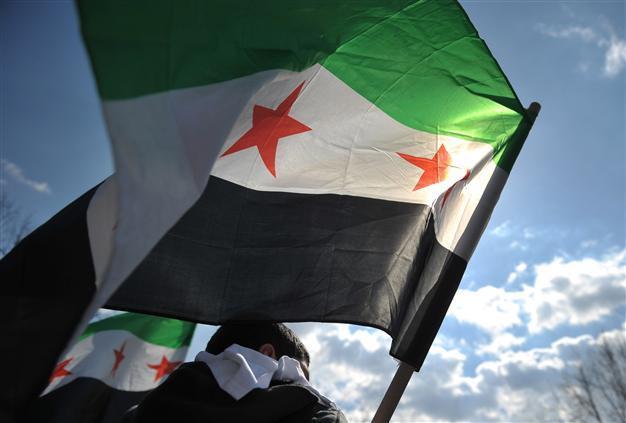US grants Syrian opposition offices diplomatic status
WASHINGTON - Agence France-Presse

A youth holds the flag of the Syrian opposition during a rally against the Syrian government on March 15, 2014 at Lafayette Square, across from the White House, in Washington to mark the third anniversary of the start of the conflict in Syria, March 15. AFP Photo
Seeking to boost the embattled Syrian opposition, Washington May 5 granted its U.S. offices diplomatic status as the rebels' political leader arrives to plead for arms to help end the three-year civil war.
A delegation led by Ahmad Jarba, head of the Syrian National Coalition (SNC), began arriving May 4 ahead of high-level talks this week with Secretary of State John Kerry and national security chief Susan Rice on his first official visit to the US since the SNC was set up in 2012.
State Department deputy spokeswoman Marie Harf said Washington was announcing new measures "to empower the moderate Syrian opposition and to bolster its efforts to help" those in Syria.
In a largely symbolic move, the U.S. now recognizes the coalition's representative offices in Washington and New York as "foreign missions under the Foreign Missions Act."
Washington, already the largest single donor of some $1.7 billion in humanitarian aid to the Syrian people, is also boosting its non-lethal support and speeding up military deliveries to what it sees as moderate rebels, now fighting both regime forces and the militant groups flooding onto the battlefield.
"This is an important step in the path toward a new Syria, its recognition on the international stage, and its relations with Syrian nationals in the U.S.," Jarba said.
He welcomed the move as "a diplomatic blow against" the legitimacy of President Bashar al-Assad.
Jarba will be accompanied on his eight-day trip by the new chief of staff of the Free Syrian Army (FSA), Brigadier General Abdelilah al-Bashir, his office said last week.
"He will meet U.S. officials to discuss the supply of sophisticated weapons to the FSA to enable it to change the balance on the ground," his office said.
U.S. officials refused to be drawn on the type of non-lethal aid or weapons being supplied by Washington.
But a senior administration official acknowledged there was "an asymmetry militarily" between the opposition rebels and the Assad regime.
The move to recognize the opposition coalition offices, which will not give the staff diplomatic immunity, comes after a peace process known as Geneva II collapsed in February.
The U.S., along with many EU allies, recognized the Syrian coalition as the legitimate representative of the Syrian people in late 2012.
New status to 'facilitate' opposition's activities
In March, Washington shuttered the Syrian embassy in the U.S. capital, prompting an angry response from Damascus.
Monday's move will "facilitate" the work of the Syrian opposition in "reaching out to the Syrian diaspora" and is something that the coalition had been calling for, Harf said. She acknowledged that it did not recognize the opposition as "the government of Syria."
But she said the enhanced status would enable them to operate as a diplomatic entity in the U.S. and help banking and security services.
A further $27 million in new non-lethal support is being unveiled taking the total in such aid to $287 million, which in the past has included such things as communications equipment, night-goggles, medical supplies and ready-to-eat meals.
Rebels recently disclosed the existence of a pilot program under which a "Western source" supplied them with 20 U.S.-made TOW anti-tank missiles, with the promise of more if they were used effectively.
"Whoever thinks there will a sustainable and decisive military solution to this is deluding themselves," the senior administration official said.
He admitted though that "the current asymmetry does not provide the calculus to get that kind of serious, negotiated political process under way."
The U.S. and its allies were trying to find "various ways to strengthen the opposition and to try to bring increased pressure of various types on the Assad regime," he insisted.
"Of course we recognize that they need to have what they need to change the situation on the ground."
He also denounced as "a parody of democracy" presidential elections being held next month in which Assad is running for another term, amid a brutal civil war that has killed more than 150,000 people since March 2011 and made millions homeless.
The move "rings particularly hollow given that the regime is continuing to attack and massacre the very electorate that it is purporting to represent," he said.
